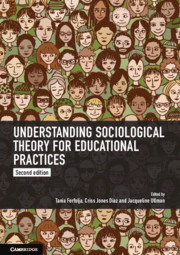Description
Understanding Sociological Theory for Educational Practices (2nd Ed.)
Language: English
Subject for Understanding Sociological Theory for Educational Practices:
Publication date: 06-2018
263 p. · 17.6x24.9 cm · Paperback
263 p. · 17.6x24.9 cm · Paperback
Description
/li>Contents
/li>
Understanding Sociological Theory for Educational Practices introduces readers to the contemporary classroom through the lens of sociological theory. By compelling readers to think critically and reflexively this book helps future teachers create a welcoming and equitable learning environment for all students. This edition has been updated to include the latest research and resources, including links to the Australian Professional Standards for Teachers (APST) to help readers connect the theory with their practice. Learning is supported through pedagogical features including key terms, case studies, end-of-chapter reflection questions and recommended resources. A new companion website features a curated suite of reading materials, extension questions and links to online resources. Understanding Sociological Theory for Educational Practices is an essential resource that enables teachers to confidently navigate the topics of diversity, disadvantage, discrimination and marginalisation in a range of educational contexts.
1. The unseen half: theories for educational practices Tania Ferfolja, Criss Jones Diaz and Jacqueline Ullman; Part I. Applying Poststructuralism: 2. Preservice teacher identities and the social construction of childhood Son Truong; 3. Gender and sexuality diversity, policy framings and the construction of the subject Tania Ferfolja; 4. Regulating 'gender climate': exploring the social construction of gender and sexuality in regional and rural Australian schools Jacqueline Ullman; Part II. Intersecting Theories for Meaning: Postcolonialism, Critical Race Theory and Cultural Theory: 5. Destabilising privilege: disrupting deficit thinking in white preservice teachers on professional experience in cultural diverse, high poverty schools Jo Lampert and Bruce Burnett; 6. More than cultural celebrations: Indigenous identities in school settings Marnee Shay; 7. Silences in growing up bi/multilingual in multicultural globalised societies: educators', families' and children's views of negotiating languages, identity and difference in childhood Criss Jones Diaz; 8. 'Disaffected' youth: intersections of class and ethnicity Mohamed Moustakim; Part III. Using Critical Theory: 9. Culture, hybridity and globalisation: rethinking multicultural education in schools Megan Watkins; 10. Social class and the classroom: a reflection on the role of schooling and mothering in the production and reproduction of disadvantage and privilege Kate Huppatz; 11. Digital literacies: understanding the literate practices of refugee kids in an after-school media club Karen Dooley; 12. Reflections on language and literacy: recognising what young people know and can do Jacqueline D'warte; 13. Final ruminations on the 'unseen half' Jacqueline Ullman, Criss Jones Diaz and Tania Ferfolja.
© 2024 LAVOISIER S.A.S.




